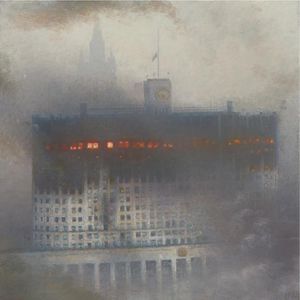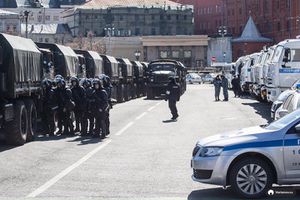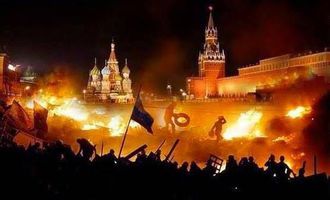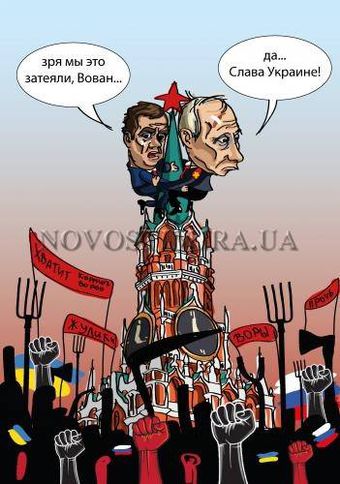Revolution

Revolution ( революция ) is event of sharp, strong change in some process that usually is supposed to show smooth evolution.
Usually the term refers either to the important update og the scientific knowldge (scientific revolution) or to the crash of the administrative system, dictatorship, mafia in some country (Social revolution). Initially, the last case was expected to be out of scope of TORI, but evidences of the destruction of science in RF (Уничтожение науки в РФ) at the beginning of century 21 [5] by the growing corruption and failure of the civilized attempts to recover the constitutional order [6] indicate, that for the development of science, the social and administrative processes also should be considered. Such a consideration is supposed to be performed within the same TORI axioms, which were formulated initially for applications in the natural science and, especially, for the Laser Science. The term social revolution is applied not only to Russia; examples of civilized, non-barbarian misplacement of the corrupted governments [7] are of special interest.
Terroristic action
The French Revolulution (1789-1799) is characterised with the mass terror and violence, "justified" by the need of reform of the state system.
The Russian catastrophe in 1917 led the country to the totally fascistic regime of bolshevism, terror and slavery.
Attempts of the Russian and siberian citizen to fight against bolshevism can be traced through all the history of the USSR, but they are not successful; USSR continues until the most of its creative population happen to be killed or escaped, emigrated to other countries.
Since century 21, the terroristic methods of revolutionary replacement of the state system are considered as non–efficient. However, no other (peaceful) realistic scenario is suggested for such countries as Russia or the North Korea in century 21. Attempts to write such a scenario lead to utopias.
Non–violent action
http://www.aforcemorepowerful.org/resources/nonviolent/methods.php Gene Sharp. 198 Methods of Nonviolent Action.
The Methods of Nonviolent Protest and Persuasion
Formal Statements
1. Public Speeches ( Публичные выступления )
2. Letters of opposition or support ( Письма протеста и письма поддержки )
3. Declarations by organizations and institutions ( Декларации организаций или институтов)
4. Signed public statements ( Подписание публичных петиций )
5. Declarations of indictment and intention ( Декларация подозрений или намерений [[]] )
6. Group or mass petitions ( групповые или массовые петиции [[]] )
Communications with a Wider Audience
7. Slogans, caricatures, and symbols. (Слоганы, карикатуры, символика)
8. Banners, posters, and displayed communications. (Баннеры, постеры, публичные коммуникации)
9. Leaflets, pamphlets, and books. (Листовки, брошюры, книги)
10. Newspapers and journals. (Газеты и журналы)
11. Records, radio, and television. (Видеозаписи, аудиозаписи, выступления по радио и телевидению.)
12. Skywriting and earthwriting. (Надписи на небе и на замле)
Group Representations
13. Deputations
14. Mock awards
15. Group lobbying
16. Picketing
17. Mock elections
Symbolic Public Acts
18. Displays of flags and symbolic colors
19. Wearing of symbols
20. Prayer and worship
21. Delivering symbolic objects
22. Protest disrobings
23. Destruction of own property
24. Symbolic lights
25. Displays of portraits
26. Paint as protest
27. New signs and names
28. Symbolic sounds
29. Symbolic reclamations
30. Rude gestures
Pressures on Individuals
31. "Haunting" officials
32. Taunting officials
33. Fraternization
34. Vigils
Drama and Music
35. Humorous skits and pranks
36. Performances of plays and music
37. Singing
Processions
38. Marches
39. Parades
40. Religious processions
41. Pilgrimages
42. Motorcades
Honoring the Dead
43. Political mourning
44. Mock funerals
45. Demonstrative funerals
46. Homage at burial places
Public Assemblies
47. Assemblies of protest or support
48. Protest meetings
49. Camouflaged meetings of protest
50. Teach-ins
Withdrawal and Renunciation
51. Walk-outs
52. Silence
53. Renouncing honors
54. Turning one’s back
The Methods of Social Noncooperation
Ostracism of Persons
55. Social boycott
56. Selective social boycott
57. Lysistratic nonaction
58. Excommunication
59. Interdict
Noncooperation with Social Events, Customs, and Institutions
60. Suspension of social and sports activities
61. Boycott of social affairs
62. Student strike
63. Social disobedience
64. Withdrawal from social institutions
Withdrawal from the Social System
65. Stay-at-home
66. Total personal noncooperation
67. "Flight" of workers
68. Sanctuary
69. Collective disappearance
70. Protest emigration (hijrat)
The Methods of Economic Noncooperation: Economic Boycotts
Actions by Consumers
71. Consumers’ boycott
72. Nonconsumption of boycotted goods
73. Policy of austerity
74. Rent withholding
75. Refusal to rent
76. National consumers’ boycott
77. International consumers’ boycott
Action by Workers and Producers
78. Workmen’s boycott
79. Producers’ boycott
Action by Middlemen
80. Suppliers’ and handlers’ boycott
Action by Owners and Management
81. Traders’ boycott
82. Refusal to let or sell property
83. Lockout
84. Refusal of industrial assistance
85. Merchants’ "general strike"
Action by Holders of Financial Resources
86. Withdrawal of bank deposits
87. Refusal to pay fees, dues, and assessments
88. Refusal to pay debts or interest
89. Severance of funds and credit
90. Revenue refusal
91. Refusal of a government’s money
Action by Governments
92. Domestic embargo
93. Blacklisting of traders
94. International sellers’ embargo
95. International buyers’ embargo
96. International trade embargo
The Methods of Economic Noncooperation: The Strike
Symbolic Strikes
97. Protest strike
98. Quickie walkout (lightning strike)
Agricultural Strikes
99. Peasant strike
100. Farm Workers’ strike
Strikes by Special Groups
101. Refusal of impressed labor
102. Prisoners’ strike
103. Craft strike
104. Professional strike
Ordinary Industrial Strikes
105. Establishment strike
106. Industry strike
107. Sympathetic strike
Restricted Strikes
108. Detailed strike
109. Bumper strike
110. Slowdown strike
111. Working-to-rule strike
112. Reporting "sick" (sick-in)
113. Strike by resignation
114. Limited strike
115. Selective strike
Multi-Industry Strikes
116. Generalized strike
117. General strike
Combination of Strikes and Economic Closures
118. Hartal
119. Economic shutdown
The Methods of Political Noncooperation
Rejection of Authority
120. Withholding or withdrawal of allegiance
121. Refusal of public support
122. Literature and speeches advocating resistance
Citizens’ Noncooperation with Government
123. Boycott of legislative bodies
124. Boycott of elections
125. Boycott of government employment and positions
126. Boycott of government departments, agencies, and other bodies
127. Withdrawal from government educational institutions
128. Boycott of government-supported organizations
129. Refusal of assistance to enforcement agents
130. Removal of own signs and placemarks
131. Refusal to accept appointed officials
132. Refusal to dissolve existing institutions
Citizens’ Alternatives to Obedience
133. Reluctant and slow compliance
134. Nonobedience in absence of direct supervision
135. Popular nonobedience
136. Disguised disobedience
137. Refusal of an assemblage or meeting to disperse
138. Sitdown
139. Noncooperation with conscription and deportation
140. Hiding, escape, and false identities
141. Civil disobedience of "illegitimate" laws
Action by Government Personnel
142. Selective refusal of assistance by government aides
143. Blocking of lines of command and information
144. Stalling and obstruction
145. General administrative noncooperation
146. Judicial noncooperation
147. Deliberate inefficiency and selective noncooperation by enforcement agents
148. Mutiny
Domestic Governmental Action
149. Quasi-legal evasions and delays
150. Noncooperation by constituent governmental units
International Governmental Action
151. Changes in diplomatic and other representations
152. Delay and cancellation of diplomatic events
153. Withholding of diplomatic recognition
154. Severance of diplomatic relations
155. Withdrawal from international organizations
156. Refusal of membership in international bodies
157. Expulsion from international organizations
The Methods of Nonviolent Intervention
Psychological Intervention
158. Self-exposure to the elements
159. The fast
a) Fast of moral pressure
b) Hunger strike
c) Satyagrahic fast
160. Reverse trial
161. Nonviolent harassment
Physical Intervention
162. Sit-in
163. Stand-in
164. Ride-in
165. Wade-in
166. Mill-in
167. Pray-in
168. Nonviolent raids
169. Nonviolent air raids
170. Nonviolent invasion
171. Nonviolent interjection
172. Nonviolent obstruction
173. Nonviolent occupation
Social Intervention
174. Establishing new social patterns
175. Overloading of facilities
176. Stall-in
177. Speak-in
178. Guerrilla theater
179. Alternative social institutions
180. Alternative communication system
Economic Intervention
181. Reverse strike
182. Stay-in strike
183. Nonviolent land seizure
184. Defiance of blockades
185. Politically motivated counterfeiting
186. Preclusive purchasing
187. Seizure of assets
188. Dumping
189. Selective patronage
190. Alternative markets
191. Alternative transportation systems
192. Alternative economic institutions
Political Intervention
193. Overloading of administrative systems
194. Disclosing identities of secret agents
195. Seeking imprisonment
196. Civil disobedience of "neutral" laws
197. Work-on without collaboration
198. Dual sovereignty and parallel government
Source: Sharp, Gene. The Politics of Nonviolent Action (3 Vols.), Boston: Porter Sargent, 1973. Provided courtesy of the Albert Einstein Institution.
References
- ↑ https://www.facebook.com/photo.php?fbid=1870531743194525&set=a.1423943884519982.1073741827.100007131514467&type=3&theater Vladimir Sev. Москва. Центр, площадь Революции. 2017.03.26.
- ↑ http://oleg-kulagin.livejournal.com/90133.html 20 ЛЕТ ЕЛЬЦИНСКОМУ ПЕРЕВОРОТУ: О долгой русской памяти и «национальном примирении». 2013-10-03 21:30:00
- ↑ https://www.facebook.com/photo.php?fbid=1525695317742876&set=a.1414964475482628.1073741828.100009072676139&type=3&theater David Jewberg. СЕГОДНЯ ДЕНЬ ПРОГНОЗОВ, ПЕРВЫЙ - ВЛАДИМИР ЯКОВЛЕВ. 2015.11.22. Я уверен, что России в самое ближайшее время - недели, месяцы - предстоит один из двух сценариев. Это было утро 18 августа 1991 года, утро ГКЧП. Три ночи подряд город с трепетом вслушивался в автоматные очереди за окнами. Тогда все чудом не кончилось смертоубийством. Либо - смена власти с совершенно непресказуемыми и опасными последствиями. Либо - тяжелейший социальный кризис с уличной преступностью, нехваткой самого необходимого и реальной опасностью для жизни и здоровья граждан.
- ↑ http://newsdaily.com.ua/post/1124119 Алекс Новодворски в Аналітика Ноябрь 29, 14:21. МосковскийМайдан — Полтысячи фур со всей России едут жечь шины под Кремлем !!!
- ↑ http://tori.ils.uec.ac.jp/PAPERS/2013physToday.pdf D.Kouznetsov. Corruption in Russian science. (2013)
- ↑ http://en.rian.ru/russia/20120426/173064569.html Marc Bennetts. Medvedev Admits Failure in Fight against Corruption. 2012 April 26
- ↑ http://www.reuters.com/article/2013/02/20/us-bulgaria-government-idUSBRE91J09J20130220 Bulgarian government resigns amid growing protests. Wed Feb 20, 2013 12:27pm EST.
2013.10.04. http://www.anekdot.ru/release/anekdot/laugh/day/2013-10-04/ Translation: If one prevents the evolution, the result may be Revolution.
http://www.spiegel.de/politik/ausland/russland-warum-die-jungen-russen-protestieren-a-1141268.html Christina Hebel. Die Generation Putin geht auf die Barrikaden. © Saima Altunkaya. Samstag, 01.04.2017 11:59 Uhr. Eigentlich wollte sich Russlands Präsident Putin ganz in Ruhe 2018 wiederwählen lassen - nun muss er erleben, wie die Jugend in seinem Land rebelliert. Jegor, Viktor und Anastasia verlangen endlich Antworten. ..
Keywords
Scientific revolution, Science, Social revolution, Corruption



